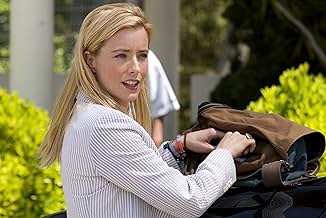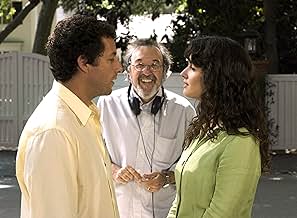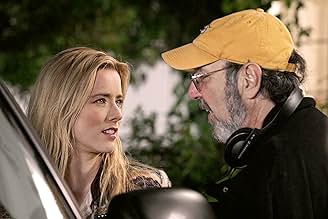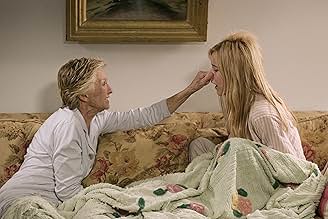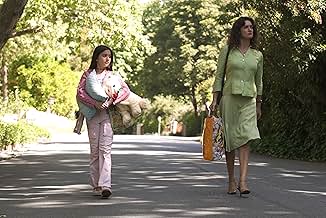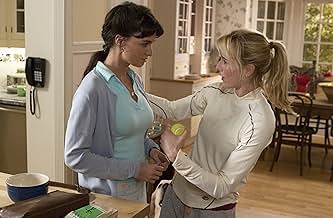A woman and her daughter leave Mexico for a better life in America, where they start working for a family whose patriarch is a newly-celebrated chef with an insecure wife.A woman and her daughter leave Mexico for a better life in America, where they start working for a family whose patriarch is a newly-celebrated chef with an insecure wife.A woman and her daughter leave Mexico for a better life in America, where they start working for a family whose patriarch is a newly-celebrated chef with an insecure wife.
- Awards
- 5 wins & 15 nominations total
Ian Donovan Hyland
- Georgie
- (as Ian Hyland)
Cecilia Suárez
- Monica
- (as Cecilia Suarez)
- Director
- Writer
- All cast & crew
- Production, box office & more at IMDbPro
Featured reviews
Adam Sandler returns to romantic comedy/drama in Spanglish, written and directed by James L. Brooks, who has fine tuned the genre with excellent scripts and sensitive acting (Terms of Endearment, As Good as It Gets). It doesn't quite measure up to his best work, but that's still saying something.
Deborah Clasky (Tea Leoni) hires a housekeeper/cook, Flor Moreno (Paz Vega), who doesn't speak English. Flor, a single mother, has a teenaged daughter, Cristina, and the two eventually move into a summer beach house with Leoni, her two kids, and husband, John Clasky (Adam Sandler), a world renowned chef. Deborah is a nervous, controlling type A personality, who has recently lost her job and begins to question her worth. Her subsequent actions such as lowering the self esteem of her overweight daughter, Bernice, and doting over Flor's daughter without mother's consent starts a sequence of events that pulls the two families apart and draw two frustrated, lonely people together, namely Sandler and Vega. They connect, of course, but what they do about it forms the focus of the storyline. At times this film thematically recalls classics like Roman Holiday or Brief Encounter.
The film begins in such a manner to make one think that it isn't anything special but builds its story and characters into solid foundations until you begin to care about what happens. This is almost two films thematically. There is the developing love story between Sandler and Vega, and there is also the story of Vega, the mother, and her daughter. This is not just a family torn apart or a budding, forbidden romance, it is also the core mother-daughter dynamic seen though the teenaged daughters and their respective mothers. The narrative from Cristina's point of view recalls I Remember Mama. And let us not forget the relationship of Deborah and her own mother (Cloris Leachman-a Brooks alumnus from The Mary Tyler Moore Show). The ending is a bit open ended for one storyline while the other is resolved quite nicely.
At times, the dialogue (a good portion is in Spanish and cleverly translated or communicated through context without subtitles) is crisp and sharp and other times, the story seems to tease without delivering and seemingly loses track until it gets reeled back by a brilliant line or two. Some of the situations seem a bit forced or going nowhere but Brooks has spoiled his audiences with his top flight writing over the years. It is remarkable that he can show lesser filmmakers how to write and construct a superior screenplay about people that an audience cares about. He makes stories about people that matter.
Tea Leoni is good in her role as the neurotic housewife who becomes self absorbed. At times her character downright grates on the nerves, and you wonder how a man like Sandler's compassionate, loving husband/father, puts up with her behavior. Sandler does fine with his down-to-earth, dramatic role which contrasts with his quirky romantic in Punch Drunk Love. One wonders what a stronger persona like Brooks alumnus Jack Nicholson or even Tom Hanks would have done with his role. All the supporting roles are effective as usual. Leachman registers as the mother who consoles her adult daughter and is the voice of reason despite being the family alcoholic. Even the family dog becomes a small but noteworthy supporting character. There is also an amusing cameo by Thomas Haden Church who plays a character not unlike his more substantial role in Sideways.
Production values are strong across the board particularly in the cinematography by John Seale. But it's really all about the writing and the acting. The film feels like it wants to be something more but settles for the quality of a moderate Brooks film like Broadcast News. The film will elicit laughs and some tears but it is consistently engaging. Wouldn't it be nice if more films could even reach that level of writing and acting? Is this a great film? No. It is merely a well written story, and that's pretty good on its own.
Deborah Clasky (Tea Leoni) hires a housekeeper/cook, Flor Moreno (Paz Vega), who doesn't speak English. Flor, a single mother, has a teenaged daughter, Cristina, and the two eventually move into a summer beach house with Leoni, her two kids, and husband, John Clasky (Adam Sandler), a world renowned chef. Deborah is a nervous, controlling type A personality, who has recently lost her job and begins to question her worth. Her subsequent actions such as lowering the self esteem of her overweight daughter, Bernice, and doting over Flor's daughter without mother's consent starts a sequence of events that pulls the two families apart and draw two frustrated, lonely people together, namely Sandler and Vega. They connect, of course, but what they do about it forms the focus of the storyline. At times this film thematically recalls classics like Roman Holiday or Brief Encounter.
The film begins in such a manner to make one think that it isn't anything special but builds its story and characters into solid foundations until you begin to care about what happens. This is almost two films thematically. There is the developing love story between Sandler and Vega, and there is also the story of Vega, the mother, and her daughter. This is not just a family torn apart or a budding, forbidden romance, it is also the core mother-daughter dynamic seen though the teenaged daughters and their respective mothers. The narrative from Cristina's point of view recalls I Remember Mama. And let us not forget the relationship of Deborah and her own mother (Cloris Leachman-a Brooks alumnus from The Mary Tyler Moore Show). The ending is a bit open ended for one storyline while the other is resolved quite nicely.
At times, the dialogue (a good portion is in Spanish and cleverly translated or communicated through context without subtitles) is crisp and sharp and other times, the story seems to tease without delivering and seemingly loses track until it gets reeled back by a brilliant line or two. Some of the situations seem a bit forced or going nowhere but Brooks has spoiled his audiences with his top flight writing over the years. It is remarkable that he can show lesser filmmakers how to write and construct a superior screenplay about people that an audience cares about. He makes stories about people that matter.
Tea Leoni is good in her role as the neurotic housewife who becomes self absorbed. At times her character downright grates on the nerves, and you wonder how a man like Sandler's compassionate, loving husband/father, puts up with her behavior. Sandler does fine with his down-to-earth, dramatic role which contrasts with his quirky romantic in Punch Drunk Love. One wonders what a stronger persona like Brooks alumnus Jack Nicholson or even Tom Hanks would have done with his role. All the supporting roles are effective as usual. Leachman registers as the mother who consoles her adult daughter and is the voice of reason despite being the family alcoholic. Even the family dog becomes a small but noteworthy supporting character. There is also an amusing cameo by Thomas Haden Church who plays a character not unlike his more substantial role in Sideways.
Production values are strong across the board particularly in the cinematography by John Seale. But it's really all about the writing and the acting. The film feels like it wants to be something more but settles for the quality of a moderate Brooks film like Broadcast News. The film will elicit laughs and some tears but it is consistently engaging. Wouldn't it be nice if more films could even reach that level of writing and acting? Is this a great film? No. It is merely a well written story, and that's pretty good on its own.
There is most certainly something in Spanglish for every member of your family! The cast is fabulous. Spaniard Paz Vega appears quite natural and convincing as Mexican Flor Moreno. Adam Sandler shows definite versatility as both a dramatic and comedic actor. Tea Leoni, here almost outshines everyone in her role of a rather endearing but neurotic American housewife. And the young, Shelbie Bruce, playing the role of Flors daughter, Cristina, waxes totally bilingual/bicultural.
However, do not let your pre-viewing expectations get too high! Regardless of being a must see film for all Hispanics who live, have lived or who have had an extended stay in the U. S., Spanglish does have its faults! Producer/director/writer, James L. Brooks, despite having directed such classics as Broadcast News, As Good As It Gets and Terms of Endearment, seems that here there are moments he became too enamored of his own work, causing some excesses. The film drags a bit at over 2 hours. It would have been a more enjoyable film if Brooks had left at least 10 or 15 minutes on the cutting room floor.
In most of the standard areas one eveluates regarding the production values used in making Spanglish... It seems that just about all of them are quite acceptable. Probably even a tad better than most!
However, Spanglish does suffer from moments of rather lackluster script-writing and direction of its principle characters, with too many mugging facial close-ups. These exaggerated expressions often did not seem the least bit natural. Spanglish also would like to convince us that someone can go from a beginner in English to someone with tremendous proficiency in a breezy 2 or 3 months! That seems like quite a lot of Suspension of Disbelief! If it were that easy, we would all speak five languages, right? Despite the few weaknesses highlighted here, Spanglish is guaranteed to impact you a lot! 7*******
This review was redacted after going over the IMDb guidelines for submitting Reviews with the utmost intensive and extreme care. I am certain that it meets all the standards and points mentioned therein. So most certainly...I hope this Review will meet with Your approval and considered to be Helpful.....Enjoy!
However, do not let your pre-viewing expectations get too high! Regardless of being a must see film for all Hispanics who live, have lived or who have had an extended stay in the U. S., Spanglish does have its faults! Producer/director/writer, James L. Brooks, despite having directed such classics as Broadcast News, As Good As It Gets and Terms of Endearment, seems that here there are moments he became too enamored of his own work, causing some excesses. The film drags a bit at over 2 hours. It would have been a more enjoyable film if Brooks had left at least 10 or 15 minutes on the cutting room floor.
In most of the standard areas one eveluates regarding the production values used in making Spanglish... It seems that just about all of them are quite acceptable. Probably even a tad better than most!
However, Spanglish does suffer from moments of rather lackluster script-writing and direction of its principle characters, with too many mugging facial close-ups. These exaggerated expressions often did not seem the least bit natural. Spanglish also would like to convince us that someone can go from a beginner in English to someone with tremendous proficiency in a breezy 2 or 3 months! That seems like quite a lot of Suspension of Disbelief! If it were that easy, we would all speak five languages, right? Despite the few weaknesses highlighted here, Spanglish is guaranteed to impact you a lot! 7*******
This review was redacted after going over the IMDb guidelines for submitting Reviews with the utmost intensive and extreme care. I am certain that it meets all the standards and points mentioned therein. So most certainly...I hope this Review will meet with Your approval and considered to be Helpful.....Enjoy!
Spanglish navigates between drama and comedy with a strong cast and moments that capture the complexity of human relationships. However, its narrative lacks a clear storyline, unfolding more like a mosaic of interactions and conflicts among its characters.
The story is narrated by Cristina, a 17-year-old girl, as a tender recollection of her mother, Flor. Through her Princeton admission essay, the film explores her family's immigration journey, adding layers of emotional manipulation to the narrative. Flor, who learns English to better connect with the family she works for, brings invaluable common sense to a household filled with chaos.
Deborah (Téa Leoni), meanwhile, is a neurotic woman going through an identity crisis after losing her job as a commercial designer. While her behavior often crosses the line-like when she buys her daughter Bernice smaller-sized clothes to "encourage" her to lose weight-Leoni manages to make Deborah humanly endearing, even when she constantly oversteps boundaries. Her lack of consideration gives Flor an opportunity to shine with her intelligence, while Bernice and John (Adam Sandler) eloquently express their indignation, allowing the audience to draw its own conclusions.
Adam Sandler delivers a surprisingly authentic performance as John, a chef hailed as the best in America by The New York Times. While one might expect his character to be a perfectionist tyrant with anger issues, John turns out to be a sweet and genuine man-reminiscent of the lovable characters Sandler is known for. His moments with his daughter Bernice, portrayed with freshness by Sarah Steele in her film debut, are heartfelt and stand out as some of the most memorable in the movie.
Though Flor is endearing as a mother and central figure in the story, Paz Vega's character occasionally feels unreal in her reactions. Some of her decisions seem overly idealized, which detracts slightly from the credibility of her role in such an intimate and human context.
Despite its gaps in plausibility, Spanglish remains compelling, mainly because of the emotional connection it fosters between its characters and the audience. While it's not always a cohesive story, its ability to depict the ups and downs of family life and cultural tensions makes it a worthwhile journey.
The story is narrated by Cristina, a 17-year-old girl, as a tender recollection of her mother, Flor. Through her Princeton admission essay, the film explores her family's immigration journey, adding layers of emotional manipulation to the narrative. Flor, who learns English to better connect with the family she works for, brings invaluable common sense to a household filled with chaos.
Deborah (Téa Leoni), meanwhile, is a neurotic woman going through an identity crisis after losing her job as a commercial designer. While her behavior often crosses the line-like when she buys her daughter Bernice smaller-sized clothes to "encourage" her to lose weight-Leoni manages to make Deborah humanly endearing, even when she constantly oversteps boundaries. Her lack of consideration gives Flor an opportunity to shine with her intelligence, while Bernice and John (Adam Sandler) eloquently express their indignation, allowing the audience to draw its own conclusions.
Adam Sandler delivers a surprisingly authentic performance as John, a chef hailed as the best in America by The New York Times. While one might expect his character to be a perfectionist tyrant with anger issues, John turns out to be a sweet and genuine man-reminiscent of the lovable characters Sandler is known for. His moments with his daughter Bernice, portrayed with freshness by Sarah Steele in her film debut, are heartfelt and stand out as some of the most memorable in the movie.
Though Flor is endearing as a mother and central figure in the story, Paz Vega's character occasionally feels unreal in her reactions. Some of her decisions seem overly idealized, which detracts slightly from the credibility of her role in such an intimate and human context.
Despite its gaps in plausibility, Spanglish remains compelling, mainly because of the emotional connection it fosters between its characters and the audience. While it's not always a cohesive story, its ability to depict the ups and downs of family life and cultural tensions makes it a worthwhile journey.
Gregory Nava's "El Norte" was a memorable journey into the Latino experience in white wealthy country. That masterpiece had a heartbreaking scene between the Latino maid and a washing machine. "Spanglish" merely hints to a similar moment between the Latino maid and a coffee machine. The "merely hinting" is at the heart of this painful comedy of manners. This is the journey of an observer not of someone who actually lived it. As a consequence he treats his own with an iron hand and the others with a romantic, heroic, fairy taleish sort of slant. Putting aside the potential seriousness of the story, the film is a moving, entertainment fantasy in the land of opulence and guilt. The borders here are not geographic but personal, the aliens are the natives. They become illegal in their own existence and step all over their own lives without noticing, trying to care, trying to be the best they can possibly be but without points of reference or enough substance for their acts to have any kind of real meaning. Tea Leoni gives a performance of such fearlessness that sometimes you feel she may jump out of the screen. Cloris Leachman is great as an alcoholic wise woman who doesn't want to be judged. Paz Vega represents the ideal Latin heroine in a wealthy American's story. She is beautiful and powerful and utterly unlikely. Adam Sandler is Adam Sandler and seems to stand passively between the blonder than blond world of his wife and the exotic gorgeousness world of his maid. I would like to know what happened to Paz and her daughter after leaving behind the chances to be or become like everyone else in the white wealthy country of make believe, or is that too much to ask.
SPANGLISH - a term with negative connotation to numerous Spanish-Americans (or at least to the first generation or older immigrants).
As the title implies, the movie makes a very interesting and subtle social commentary about the Mexican American dynamics/contrast in society. Obviously as expected, the film illustrates a few stereotypes. For example, when Florrr's (played by Paz Vega) cousin, Cecilia hit the sliding glass door and her nose bled, the wife Deborah Clasky (played by Tia Leone) offered her money instead. It's sad but true in today's society.
But what make the film interesting are its subtleties. For instance the casting and the characters itself. The producers could have hired a blonde blue eyed male lead instead of Adam Sandler, but they did not. Why? Because Sandler's character (John Clasky) is an antithesis of the wife, Deborah Clasky. She's blonde blue eyed superficial, emotionally disturbed, patronizing, solipsistic, white housewife, who the writer ( Brooks )probably wants to portray as the epitome of everything that is bad about white people - or Americans for that matter (however exaggerated they portrayed her to be). You can empathize with the husband's character and Adam Sandler played it very well. It's interesting to note, the husbands character's last name is Clasky - possibly his ancestors were immigrants as well. And his character is portrayed as someone who "gets it", someone who understands Florrr - an immigrant mother who wants her daughter raised with her own values and integrity even though she is only a lowly servant to the Clasky's.
One of the interesting scenes in the film that I found very clever was the argument between Florrrr and John. It showed the two sides of the dynamic. While I was watching it I thought to myself, any other individual would immediately apologize and patronize the immigrant housemaid in the expense of goodwill. But I was surprised that Sandler's character actually called her a "hypocrite" instead, and she realized he has a point. Not to criticize her (it's probably what Deborah would have done) would be hypocritical as well. This is another social commentary that was written very well and cleverly portrayed in the film.
The acting is equally superb. You could just hate some of the characters specially the housewife and the daughter Cristina Moreno (played by Shelbie Bruce). You can just empathize with Adam Sandler's character and his daughter, Bernice. The only people amongst the Claskys that is very adult. The grandmother's character on the other hand (played by Cloris Leachman ) whose always drinking provides a respite to the insanity in the story and ironically always the unobtrusive and yet emphatic character despite how she lived her life. In the end she was the voice of reason for the wife.
Equally, the dialogue is worth mentioning. Interestingly, there are no subtitles on all the Spanish spoken dialogue but the audience can kind of get the gist of what's being said or argued. It can be distracting to some audiences but thankfully, Florrr's character learned to speak English in the second half of the film. Also, the Spanish without subtitles added a few good scenes in the film and added a positive credence to the title SPANGLISH. It illustrates how to write the quintessential part of the screenplay without making it too cliché.
Overall, I liked this film. If you can look at it in the same light as I saw the film, you would enjoy it too and find it cleverly written and directed. Otherwise, it could be a little slow and the dialogue can be a little bit distracting. It doesn't help some of it is in Spanish and Adam sandler's character cannot express himself very well verbally.
As the title implies, the movie makes a very interesting and subtle social commentary about the Mexican American dynamics/contrast in society. Obviously as expected, the film illustrates a few stereotypes. For example, when Florrr's (played by Paz Vega) cousin, Cecilia hit the sliding glass door and her nose bled, the wife Deborah Clasky (played by Tia Leone) offered her money instead. It's sad but true in today's society.
But what make the film interesting are its subtleties. For instance the casting and the characters itself. The producers could have hired a blonde blue eyed male lead instead of Adam Sandler, but they did not. Why? Because Sandler's character (John Clasky) is an antithesis of the wife, Deborah Clasky. She's blonde blue eyed superficial, emotionally disturbed, patronizing, solipsistic, white housewife, who the writer ( Brooks )probably wants to portray as the epitome of everything that is bad about white people - or Americans for that matter (however exaggerated they portrayed her to be). You can empathize with the husband's character and Adam Sandler played it very well. It's interesting to note, the husbands character's last name is Clasky - possibly his ancestors were immigrants as well. And his character is portrayed as someone who "gets it", someone who understands Florrr - an immigrant mother who wants her daughter raised with her own values and integrity even though she is only a lowly servant to the Clasky's.
One of the interesting scenes in the film that I found very clever was the argument between Florrrr and John. It showed the two sides of the dynamic. While I was watching it I thought to myself, any other individual would immediately apologize and patronize the immigrant housemaid in the expense of goodwill. But I was surprised that Sandler's character actually called her a "hypocrite" instead, and she realized he has a point. Not to criticize her (it's probably what Deborah would have done) would be hypocritical as well. This is another social commentary that was written very well and cleverly portrayed in the film.
The acting is equally superb. You could just hate some of the characters specially the housewife and the daughter Cristina Moreno (played by Shelbie Bruce). You can just empathize with Adam Sandler's character and his daughter, Bernice. The only people amongst the Claskys that is very adult. The grandmother's character on the other hand (played by Cloris Leachman ) whose always drinking provides a respite to the insanity in the story and ironically always the unobtrusive and yet emphatic character despite how she lived her life. In the end she was the voice of reason for the wife.
Equally, the dialogue is worth mentioning. Interestingly, there are no subtitles on all the Spanish spoken dialogue but the audience can kind of get the gist of what's being said or argued. It can be distracting to some audiences but thankfully, Florrr's character learned to speak English in the second half of the film. Also, the Spanish without subtitles added a few good scenes in the film and added a positive credence to the title SPANGLISH. It illustrates how to write the quintessential part of the screenplay without making it too cliché.
Overall, I liked this film. If you can look at it in the same light as I saw the film, you would enjoy it too and find it cleverly written and directed. Otherwise, it could be a little slow and the dialogue can be a little bit distracting. It doesn't help some of it is in Spanish and Adam sandler's character cannot express himself very well verbally.
Did you know
- TriviaThe chefs and cooks used in the kitchen scene are actual Le Cordon Bleu students from the nearby cooking school in Pasadena, California.
- GoofsWhen Deborah is picked up by Mike - The Realtor (played by Thomas Haden Church) and he backs his Audi out of the driveway, there is no license plate on the car. In the next shot, it suddenly has one.
- Quotes
Flor Moreno: Is what you want for yourself to become someone very different than me?
- Crazy creditsNo actors were mistreated in the making of this film.
- ConnectionsFeatured in HBO First Look: The Making of 'Spanglish' (2004)
- SoundtracksHistoria de un Amor
Music by Carlos Eleta Almaran
Lyrics by Carlos Eleta Almaran
Performed by Luis Miguel
Courtesy of Warner Music Latina
By arrangement with Warner Strategic Marketing
- How long is Spanglish?Powered by Alexa
Details
Box office
- Budget
- $80,000,000 (estimated)
- Gross US & Canada
- $42,726,869
- Opening weekend US & Canada
- $8,817,853
- Dec 19, 2004
- Gross worldwide
- $55,470,154
- Runtime
- 2h 11m(131 min)
- Color
- Sound mix
- Aspect ratio
- 1.85 : 1
Contribute to this page
Suggest an edit or add missing content







